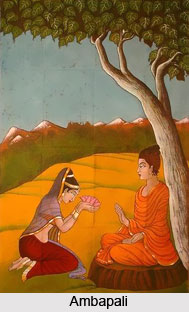 Ambapali also known, as Amprapali was a royal courtesan of the republic state of Vaishali in ancient India. The mention of her name is found in the old Pali texts and the Buddhist scriptures. Derived from two Sanskrit terms, `amra` which signifies mango and `pali` which signifies leaves, the full significance of her name stands as " a child of the mango grove". She was so named, as the identity of her parents were not known and was found at the foot of a mango tree in one of the royal gardens of Vaishali. She grew up to be as lovely as the golden sun rising from the deep ocean but she was immoral in character. Her ideal beauty mesmerized many young nobles of the republic and they wished for her company and contended for her favors. She was also accorded the status of the state courtesan of the capital city of the republic of Vaishali in order to end their quarrels. She on her part agreed on five conditions on of which was that her charge would be 500 kahapana. Tales of her unparalleled beauty spread as far as the Magadha Empire, which was the hostile neighbor of the republic state of Vaishali. The Magadha monarch was so infatuated with her that he married her during an incognito visit during his invasion of Vaishali. She bore a son to him who was named as Vimala Kondanna.
Ambapali also known, as Amprapali was a royal courtesan of the republic state of Vaishali in ancient India. The mention of her name is found in the old Pali texts and the Buddhist scriptures. Derived from two Sanskrit terms, `amra` which signifies mango and `pali` which signifies leaves, the full significance of her name stands as " a child of the mango grove". She was so named, as the identity of her parents were not known and was found at the foot of a mango tree in one of the royal gardens of Vaishali. She grew up to be as lovely as the golden sun rising from the deep ocean but she was immoral in character. Her ideal beauty mesmerized many young nobles of the republic and they wished for her company and contended for her favors. She was also accorded the status of the state courtesan of the capital city of the republic of Vaishali in order to end their quarrels. She on her part agreed on five conditions on of which was that her charge would be 500 kahapana. Tales of her unparalleled beauty spread as far as the Magadha Empire, which was the hostile neighbor of the republic state of Vaishali. The Magadha monarch was so infatuated with her that he married her during an incognito visit during his invasion of Vaishali. She bore a son to him who was named as Vimala Kondanna.
Once when Buddha and his disciples stopped at Vaishali for one day, Ambapali offered them the use of her garden of mangoes outside the city so that they might rest in the cool shade of the trees. When she went to meet Buddha in the garden she was utterly surprised to witness the halo around him, which glowed like the midnight moon. After Ambapali received the Dharma from Buddha she bowed down at his feet and invited the Lord and his disciples to a meal the following day, which was accepted by the latter. On her way back the nobles of Vaishali offered her great riches to sell the honor of the company of Buddha but she refused it saying that even if she were offered the whole of Vaishali she would not have obliged. The following day she herself attended Buddha and his followers in great humility and then offered him the garden which Buddha accepted seeing the purity of the heart that offered it. This was the turning of Ambapali`s life and understood the Dharma and became a virtuous woman and entered the order of nuns. With the heart of wisdom strengthened in her, she became an "arahant" Her transformation confirmed the belied that as the lotus springs from black and watery mud, Ambapali also despite her immoral character managed to achieve the height of spiritual development. She renounced her materialistic life and position full of riches and splendors and accepted Buddhist faith. Throughout the rest of her life she remained an active supporter of the Buddhist order. Her son by Bimbisara who also became a monk in the later stage also adopted her traits.




















